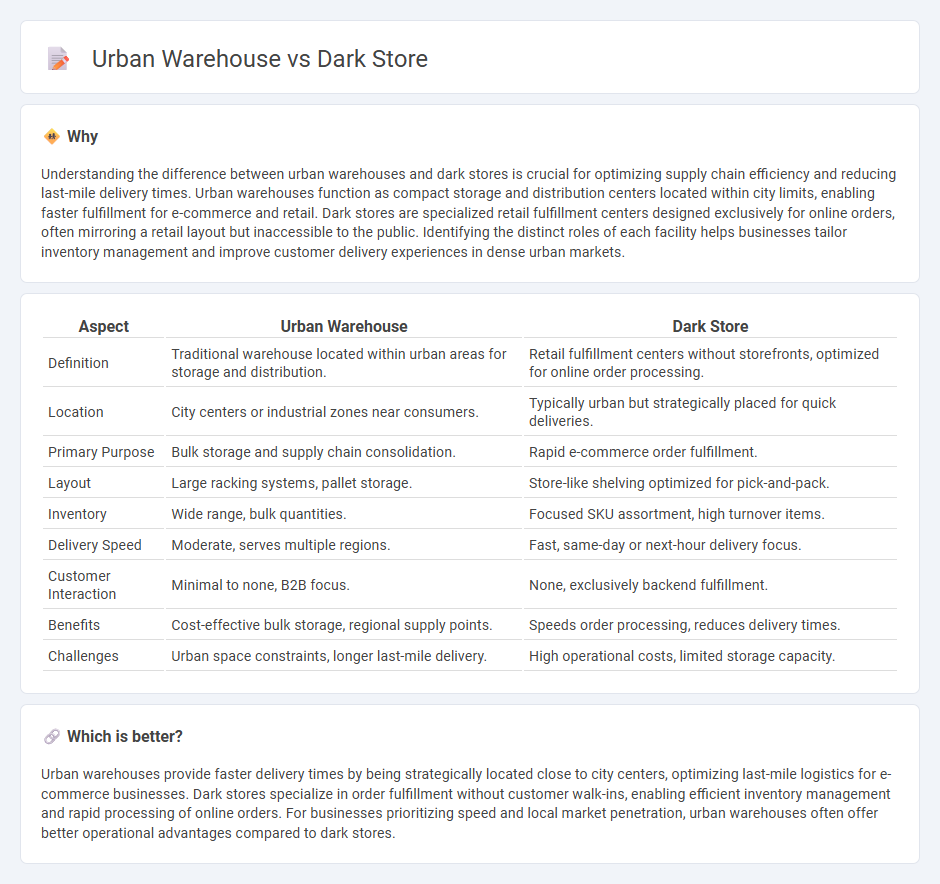
Urban warehouses are strategically located near city centers to facilitate rapid order fulfillment and last-mile delivery, enhancing supply chain efficiency for e-commerce businesses. Dark stores operate as localized fulfillment hubs without customer-facing retail spaces, optimizing inventory management and enabling faster delivery in densely populated urban areas. Explore more about how urban warehouses and dark stores reshape modern logistics solutions.
Why it is important
Understanding the difference between urban warehouses and dark stores is crucial for optimizing supply chain efficiency and reducing last-mile delivery times. Urban warehouses function as compact storage and distribution centers located within city limits, enabling faster fulfillment for e-commerce and retail. Dark stores are specialized retail fulfillment centers designed exclusively for online orders, often mirroring a retail layout but inaccessible to the public. Identifying the distinct roles of each facility helps businesses tailor inventory management and improve customer delivery experiences in dense urban markets.
Comparison Table
| Aspect | Urban Warehouse | Dark Store |
|---|---|---|
| Definition | Traditional warehouse located within urban areas for storage and distribution. | Retail fulfillment centers without storefronts, optimized for online order processing. |
| Location | City centers or industrial zones near consumers. | Typically urban but strategically placed for quick deliveries. |
| Primary Purpose | Bulk storage and supply chain consolidation. | Rapid e-commerce order fulfillment. |
| Layout | Large racking systems, pallet storage. | Store-like shelving optimized for pick-and-pack. |
| Inventory | Wide range, bulk quantities. | Focused SKU assortment, high turnover items. |
| Delivery Speed | Moderate, serves multiple regions. | Fast, same-day or next-hour delivery focus. |
| Customer Interaction | Minimal to none, B2B focus. | None, exclusively backend fulfillment. |
| Benefits | Cost-effective bulk storage, regional supply points. | Speeds order processing, reduces delivery times. |
| Challenges | Urban space constraints, longer last-mile delivery. | High operational costs, limited storage capacity. |
Which is better?
Urban warehouses provide faster delivery times by being strategically located close to city centers, optimizing last-mile logistics for e-commerce businesses. Dark stores specialize in order fulfillment without customer walk-ins, enabling efficient inventory management and rapid processing of online orders. For businesses prioritizing speed and local market penetration, urban warehouses often offer better operational advantages compared to dark stores.
Connection
Urban warehouses and dark stores are interconnected as strategic components in optimized last-mile delivery networks, enabling faster order fulfillment in dense city environments. Urban warehouses serve as centralized storage hubs, while dark stores operate as local fulfillment points designed exclusively for e-commerce orders without customer foot traffic. This synergy enhances inventory accessibility and reduces delivery times, crucial for meeting consumer demands in modern urban logistics.
Key Terms
Fulfillment Center
Dark stores and urban warehouses serve as critical fulfillment centers optimizing last-mile delivery efficiency in e-commerce. Dark stores function as localized inventory hubs designed exclusively for online order processing, enabling faster delivery within urban areas. Explore key differences and benefits to enhance your fulfillment strategy with our detailed insights.
Last-Mile Delivery
Dark stores are fulfillment centers located within urban areas designed exclusively for online order preparation, enabling rapid last-mile delivery to customers. Urban warehouses, meanwhile, function as localized storage hubs that balance inventory availability and delivery speed, often serving both online and retail demands. Explore further to understand how these models optimize last-mile delivery efficiency.
Inventory Placement
Dark stores prioritize inventory placement close to high-demand urban areas for rapid fulfillment, minimizing delivery times. Urban warehouses strategically position diverse stock within densely populated regions to support both online orders and local retail replenishment. Explore how inventory placement variations influence efficiency and customer satisfaction in last-mile delivery.
Source and External Links
Dark store - Wikipedia - A dark store is a retail outlet or distribution center exclusively for online shopping, often serving as a warehouse for order fulfillment or click-and-collect services, originating in the UK and spreading internationally.
What is a Dark Store? How to Make it Work for You - Vaimo - Dark stores are former brick-and-mortar locations converted into fulfillment centers not open to the public, allowing efficient inventory management and fast online order processing, especially growing after pandemic lockdowns.
What Is a Dark Store? - NetSuite - A dark store is a repurposed physical retail store used solely to fulfill online orders, enabling faster delivery and curbside or in-store pickup, serving as mini fulfillment depots particularly popularized by pandemic-related shifts in shopping behavior.
 dowidth.com
dowidth.com